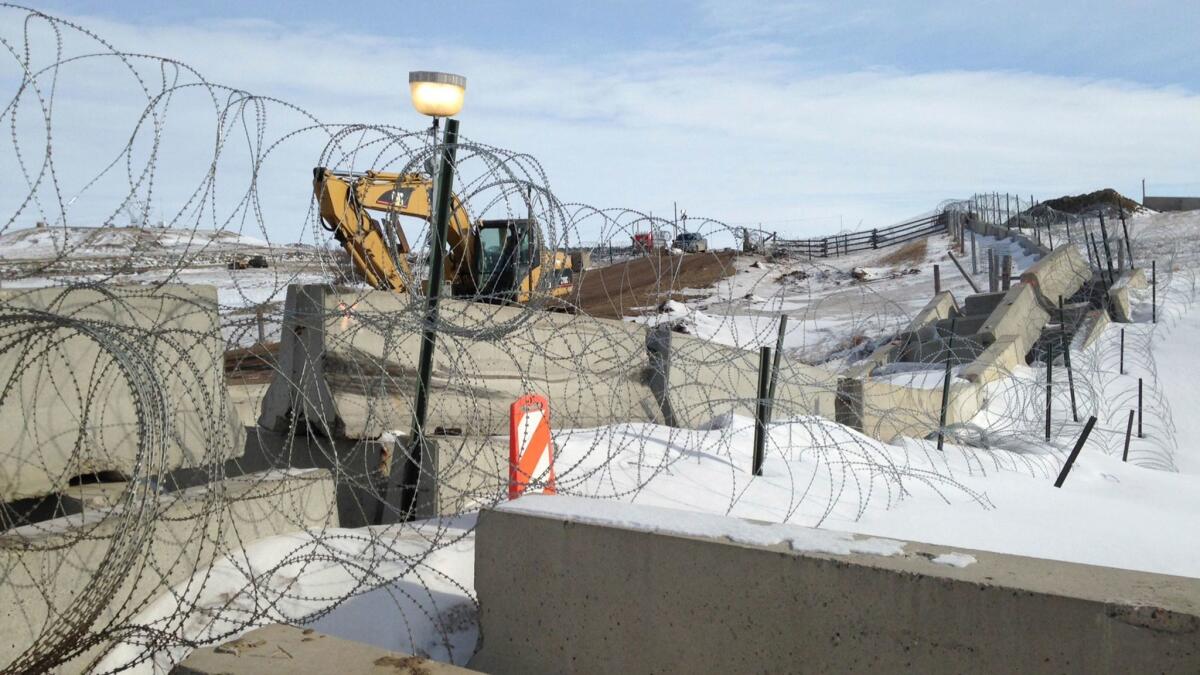Judge denies request to halt Dakota Access pipeline work

- Share via
Reporting from Washington — A federal judge on Monday rejected a request by two American Indian tribes for an emergency order halting construction of the remaining section of the Dakota Access oil pipeline.
U.S. District Judge James Boasberg, in Washington, D.C., said that as long as the oil isn’t flowing through the pipeline, there is no immediate harm to the Cheyenne River and Standing Rock Sioux tribes, which are suing to stop the project. But he said he’d consider the arguments more thoroughly at another hearing on Feb. 27.
The tribes requested the temporary injunction last week after Texas-based Energy Transfer Partners got federal permission to lay pipe under a Missouri River reservoir in North Dakota. That’s the last big section of the $3.8-billion pipeline that would need to be constructed before it could carry oil from North Dakota to Illinois.
The tribes say the pipeline would endanger their cultural sites and water supply. They added a religious freedom component to their case last week by arguing that clean water is necessary to practice the Sioux religion and that the mere presence of the pipeline renders the water impure.
At the hearing, though, Boasberg said the harm to the tribe apparently would come from the pipeline being turned on and the oil flowing through it, not from the pipeline’s mere presence.
Energy Transfer Partners received final approval from the Army Corps of Engineers last week to lay pipe under the reservoir and to complete the 1,200-mile pipeline, which would move North Dakota oil to a shipping point in Illinois. Drilling work began immediately under Lake Oahe, which is the water source for both tribes.
The company’s attorneys filed court documents early Monday urging Boasberg to reject the tribes’ request, calling the new religious freedom argument “exceedingly tardy,” ’’not construction-related” and a “last-minute delay tactic.”
“Dakota Access has the greatest respect for the religious beliefs and traditions of [tribes]. The emergency relief sought here simply is not necessary to protect the exercise of those beliefs or preserve those traditions,” wrote William Scherman, an attorney for the company.
The corps also filed court documents Monday arguing that a work stoppage isn’t warranted, saying the tribes will have plenty of time to make their case before oil flows through the pipeline.
Work under Lake Oahe had been held up in the courts until President Trump last month instructed the Army Corps of Engineers to advance construction. The Army is involved because its engineering branch manages the river and its system of hydroelectric dams, which is owned by the federal government.
The drilling work is expected to take about two months. The full pipeline system could be operational within three months.
Energy Transfer Partners maintains that the pipeline is safe and disputes that cultural sites have been affected. But an encampment near the construction in southern North Dakota drew thousands of protesters last year in support of the tribes, leading to occasional clashes with law enforcement and nearly 700 arrests. The camp has thinned to fewer than 300 people, but law enforcement officers continue to maintain a presence in the area.
ALSO
Seattle becomes the first city to sever ties with Wells Fargo in protest of Dakota Access pipeline
Waning days of the Standing Rock protests: An improvised tribe of Americans looking for ‘justice!’
Journalist faces charges after arrest while covering Dakota Access pipeline protest
More to Read
Sign up for Essential California
The most important California stories and recommendations in your inbox every morning.
You may occasionally receive promotional content from the Los Angeles Times.










